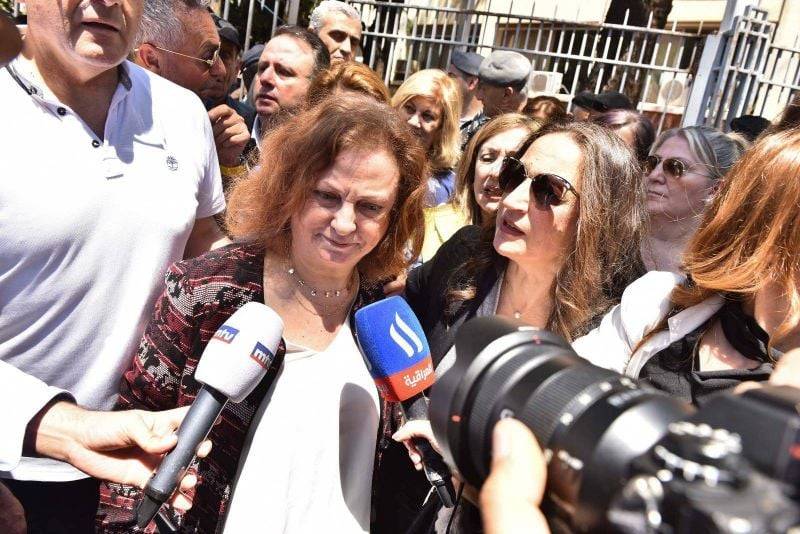
Ghada Aoun, Public Prosecutor at the Mount Lebanon Court of Appeal, in front of the Beirut courthouse, May 4, 2023. (Credit: Mohammad Yassine/L'Orient-Le Jour)
It’s official: Acting Top Public Prosecutor Jamal Hajjar’s recent dissatisfaction with Judge Ghada Aoun insisting on examining financial cases materialized on Thursday, with Hajjar suspending her from all the cases she has been handling. In practice, this is equivalent to dismissing the Mount Lebanon public prosecutor at the Court of Appeal.
Hajjar ordered the judicial police to stop complying with Judge Aoun’s instructions, which implies that she can no longer serve summonses, search warrants or any other documents in the cases she has in hand. This decision will have a significant impact on her ability to finalize her investigations.
Hajjar, who is her superior, took this step after he had recently instructed Aoun to send him certain files, particularly those relating to banking cases. Judge Aoun only sent him Bank Audi’s file, while she was also investigating other cases linked to alleged suspicious financial transactions.
In a circular dubbed, “Regulating the operation of Mount Lebanon Prosecutor’s Office at the Court of Appeal,” Hajjar asked the various security services to “no longer receive instructions” from Judge Aoun and to “deal with the advocate general at the Mount Lebanon Court of Appeal ... and the cassation prosecutor when it comes to major crimes.”
A judge at the Mount Lebanon Prosecution’s Office told L’Orient-Le Jour that there are 11 advocate generals at this office. “Every day, an advocate general is on duty,” he said, stressing that “from now on, it will be up to [the advocate general on duty] to take measures relating to proceedings before the judicial police.”
According to the source, Judge Aoun will nevertheless carry on her administrative duties, such as issuing an opinion on a decision taken by an investigative judge in a case she is handling.
A prosecution acting on its own
A source close to the Cassation Prosecution’s Office justified Hajjar’s measure, saying “It has become unacceptable that each prosecutor at the Court of Appeal opens a prosecution’s office on their own.”
The circular sent to the security services was accompanied by a statement in which the top prosecutor accused Judge Aoun of “blatantly rejecting the requests” he had sent her “based on legal powers.” He also denounced “inappropriate and unusual remarks made against the president of the Higher Judicial Council [Souheil Abboud] and other colleagues.”
Commenting on this last point, the source close to the Cassation Prosecution’s Office said, “In her reply to the missive Judge Hajjar sent her, Judge Ghada Aoun had articulated that she would only take into account the lawsuits that the bank officials filed against the state alleging serious fault by her if Souheil Abboud also takes into account a similar lawsuit she had brought against him.”
Aoun had lodged this lawsuit to prevent Abboud, in his capacity as head of the Supreme Judicial Disciplinary Council, from issuing a final decision on the appeal against the first-instance disciplinary council’s decision to remove her from office.
By law, the mere filing of this type of lawsuit alleging serious fault against a particular judge before the clerk’s office of the Plenary Assembly of the Court of Cassation will automatically result in suspending the judge from the case in question.
In the same reply, Aoun called on Hajjar to equally flex his muscles against South Lebanon Public Prosecutor at the Court of Appeal Judge Rahif Ramadan, the source added, alluding to the fact that the latter draws his strength from being close to the powerful Amal-Hezbollah tandem. This is while Judge Aoun herself is said to be affiliated with the Free Patriotic Movement which is no longer as powerful since the term of office of former President Michel Aoun ended.
Judge Aoun’s response prompted Judge Hajjar to consider in his statement published on Thursday her conduct being “contrary to the judicial principles governing the work of the public prosecutor’s office.” Referring implicitly to the judge’s tendency to sort of perform justice, he accused her of “using populism” and acting “under the guise of protecting depositors’ rights,” to “provide privileges to a minority at the expense of other depositors.”
Commenting on the decision to suspend her from her cases, Aoun wrote on X that Judge Hajjar issued a decision that is “null and void and contrary to the law.” “He does not have the power to suspend me from working,” she added. Aoun underscored that such a decision “falls within the exclusive powers of the justice minister, based on the Judicial Inspectorate’s request.”
“I urge the minister to intervene to end the transgressions that obstruct the course of justice, against an appeal prosecutor who is fulfilling her duties with full sincerity and honesty,” she added. Aoun revealed that she intends to challenge this decision before the State Shura Council on Monday.
For his part, Free Patriotic Movement leader Gebran Bassil wrote on X that it’s up to the disciplinary council to suspend a prosecutor. “The judges who prosecute the corrupt and those who stole the depositors’ money are being prosecuted instead of being rewarded,” he added, arguing that Judge Aoun’s crime is that she “dared to open cases that others did not dare to examine.” “Where is the forensic audit? Where is Optimum’s file? Where is [former BDL governor] Riad Salameh, who is being prosecuted internationally, while he is protected by the system?” he asked.
Wall of impunity
Nizar Saghieh, lawyer and director of Legal Agenda, told L’Orient-Le Jour that “the law gives the top prosecutor the power to take administrative measures against the judge and to refer her to the Judicial Inspectorate, as a prelude to proceedings before the disciplinary council, which is responsible for sanctioning her where deemed appropriate.” “However, the measure adopted in this case is itself tantamount to a judgment and a condemnation,” he added.
Saghieh believes that the problem with this “excess of power” lies in the fact that “the position of top prosecutor is closely dependent on the political authorities.” “Even a judge who does not tend to abuse his prerogatives is often led to do so because of the system,” he said.
According to Saghieh, Judge Aoun has crossed what the ruling class considers “a red line, that is to say, the Optimum Invest case, which is [allegedly] involved in an $8 billion commission deal, according to the international forensic audit firm Kroll.”
He added that “every time a top prosecutor sees a redline being crossed, he intervenes in force.” “Former Top Prosecutor Ghassan Oueidat took similar action against Judge Tarek Bitar who was leading the investigation into the port explosion,” he recalled.
“In short, the politico-judicial authority wants no accountability,” said Saghieh. “When justice doesn’t suit them, they shut it down, further raising the wall of impunity,” he added.
This article was originally published in L'Orient-Le Jour and translated by Joelle El Khoury.

